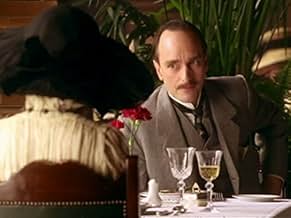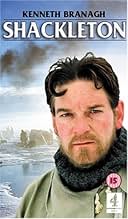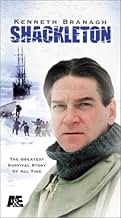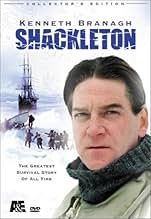Shackleton
- Mini serie TV
- 2002
- 1h 43min
Aggiungi una trama nella tua linguaThe true story of Shackleton's 1914 Endurance expedition to the South Pole, and his epic struggle to lead his twenty-eight man crew to safety after his ship was crushed in the pack ice.The true story of Shackleton's 1914 Endurance expedition to the South Pole, and his epic struggle to lead his twenty-eight man crew to safety after his ship was crushed in the pack ice.The true story of Shackleton's 1914 Endurance expedition to the South Pole, and his epic struggle to lead his twenty-eight man crew to safety after his ship was crushed in the pack ice.
- Vincitore di 2 Primetime Emmy
- 6 vittorie e 20 candidature totali
Recensioni in evidenza
Nice and breathtaking miniseries formed by two long episodes , shot in enough budget . It contains great production design, spectacular scenes and notorious as well as charming British actors. However , the film relies heavily on the complex relationships between Sir Ernest Henry Shackleton/Kenneth Branagh , his wife/Phoebe Nicholls and lover/ Embeth Davidtz . The movie gives engaging messages about fraternity, comradeship, compassion, forgiveness, love, courage and struggle for life . Including a lot of flashbacks and helping of the footage and still photos shot on the expedition. Shackelton is pretty well portrayed as the magnificent leader that he was, but is not presented as an infallible genius. He was a man who demonstrated extraordinary qualities in difficult circumstances, and he was a man who understood the burden of his leadership and the importance for getting his men home safely . Kenneth Branagh as Sir Ernest Henry Shackleton gives a very good acting . He is well accompanied by a fine plethora of Englsih players such as Corin Redgrave , Nicholas Rowe , Shaun Dooley , Kevin McNally , John Grillo , Mark Williams , Joseph Long , Mark Tandy , Robert Hardy , among others .This mini-series was written and directed by Charles Sturridge . He directed FairyTale: A True Story (1997) , A handful of dust , The scapegoat , Brideshead revisited (1981) ,Runners . And has directed various episodes , miniseries and Telefilms as Gulliver's Travels , Longitude ,The spoils of war , World in Action ,The Road to Coronation Street , Churchill's Secret , Cormoran strike , Crown Court , The Storyteller , Marcella , Sandition , Da Vinci's Demons , and several others
The miniseries finely based on historical facts , adding more remarks , these are the following ones : Sir Ernest Henry Shackleton (15 February 1874 - 5 January 1922) was a British polar explorer who led three British expeditions to the Antarctic. He was one of the principal figures of the period known as the Heroic Age of Antarctic Exploration. Born in Kilkea, County Kildare, Ireland, Shackleton and his Anglo-Irish family moved to Sydenham in suburban south London when he was ten. His first experience of the polar regions was as third officer on Captain Robert Falcon Scott's Discovery expedition of 1901-1904, from which he was sent home early on health grounds, after he and his companions Scott and Edward Adrian Wilson set a new southern record by marching to latitude 82°S. During the Nimrod expedition of 1907-1909, he and three companions established a new record Farthest South latitude at 88°S, only 97 geographical miles from the South Pole, the largest advance to the pole in exploration history. Also, members of his team climbed Mount Erebus, the most active Antarctic volcano. For these achievements, Shackleton was knighted by King Edward VII on his return home. After the race to the South Pole ended in December 1911, with Roald Amundsen's conquest, Shackleton turned his attention to the crossing of Antarctica from sea to sea, via the pole. To this end, he made preparations for what became the Imperial Trans-Antarctic Expedition, 1914-1917. Disaster struck this expedition when its ship, Endurance, became trapped in pack ice and was slowly crushed before the shore parties could be landed. The crew escaped by camping on the sea ice until it disintegrated, then by launching the lifeboats to reach Elephant Island and ultimately South Georgia Island, a stormy ocean voyage of 720 nautical miles and Shackleton's most famous exploit. In 1921, he returned to the Antarctic with the Shackleton-Rowett Expedition, but died of a heart attack while his ship was moored in South Georgia. At his wife's request, he was buried there. Away from his expeditions, Shackleton's life was generally restless and unfulfilled. In his search for rapid pathways to wealth and security, he launched business ventures which failed to prosper, and he died heavily in debt. Upon his death, he was lauded in the press but was thereafter largely forgotten, while the heroic reputation of his rival Scott was sustained for many decades. Later in the 20th century, Shackleton was "rediscovered¨, and rapidly became a role model for leadership as one who, in extreme circumstances, kept his team together in a survival story described by cultural historian Stephanie Barczewski as "incredible".
A lot of people are complaining about the length of the movie, but I believe that it adds to the quality of the movie. Rather than just a two hour "short flick" about the year-plus long voyage, it drags out for 4 hours, and rather slowly at times. I have to believe that this mirrors the ordeal that these men went through and adds to the viewer's already deep plunge into the frozen ice world.
This is by far one of the best TV movies I have ever seen. Kenneth does another fabulous job in a quality role, and to comment on someone else's observation about the film's lack of personalizing Shackleton in the second half, I also believe that to be a good choice and an accurate one. If you're leading an expedition and are dead set on keeping everyone alive, you cannot let your own emotions get involved in your decision-making, else you die with everyone else.
I give this movie a 10 because I can find no obvious flaws or anything that takes away from the experience.
This lengthy two-parter drama details the exploits of Ernest Shackleton,an explorer in the early part of the 20th century who,having vowed to reach the South Pole,finds himself forced to save the lives of himself and his 28 man crew after the ship runs into difficulty.
The most impressive thing about this film has to be the build-up.Rather than just plunge headfirst into the expedition and the trials-and-tribulations the crew faced from there,you really get into the hearts and minds of the central characters,and the development is particularly riveting to watch.All this is hindered in no way by an as-ever forceful,powerful lead performance by the always reliable Kenneth Brannagh.If there are any faults,I suppose it kind of inevitably gets a little boring in parts.Other than that,this is very well made and highly recommendable viewing.****
Kenneth Branagh, who physically resembles Shackleton, plays the man in full British hero mode, though at the same time he displays his human side, and the obsessive streak which drove him first to organise the expedition in the face of much opposition; and then to make a priority of saving himself and his men, when the Antarctic crossing became impossible. It was as though Shackleton could feel the ghost of Scott urging him on.
Much of the first of the film's two parts is taken up with Shackleton's private life; not only do we meet his wife Emily (Phoebe Nicholls) and children, but his mistress Rosalind Chetwynd (Embeth Davidtz), and his brother Frank (Mark Tandy) who embarrassingly was serving a gaol term for an unconnected fraud while Shackleton was trying to raise money for his venture. But most of all in the first episode, we learn how difficult it was for Shackleton to convince private sponsors and organisations like the Royal Geographical Society to support him.
The expedition itself is covered in the second part, when we see how after the Endurance became stuck, the team had to camp on the ice for months before rowing 800 miles in small boats, to Elephant Island. From there, Shackleton with a few others sailed, again in a small boat, to South Georgia. Even then, he had to scale and descend a difficult mountain to reach help. We then cut to the rescue of the men on Elephant Island, and we are informed only via voice-over that this eventual rescue was achieved only at the fourth attempt. It would have been more satisfying to see some of this final portion of the tale related in visuals, with some of the preliminary scenes in the first episode being cut - but production and budgetary considerations probably played a part in this.
All the acting is of a high order; but particular mention should be made of Matt Day in the key role of Frank Hurly, the Australian photographer (who shot both stills and moving film); and Ken Drury as McNish, the carpenter, the one man to argue with Shackleton about his plans and actions. Much of the action was shot in the snow and ice of Greenland and Iceland, but in the event not as much as was originally planned, and on occasion the transition from location to studio shots is apparent.(See the TV documentary - Shackleton: Breaking the Ice - about the making of the film.) Nevertheless, the film as a whole is convincing, exciting and at times moving.
The first 100 minutes is concerned with the origins of the expedition, and Shackleton's efforts to raise support and prepare for it. The son of an Irish country doctor, he served in the Merchant Navy, but by 1914 he was a very experienced polar explorer, having been on two major earlier expeditions; he was in fact the Englishman who had been closest to the South Pole and survived. Although the first half drags at times, Kenneth Branagh's full-on performance as Shackleton gives us a clear picture of the sort of man he is, ambitious, hard-driving, single-minded, yet one who genuinely cares for the men under his command. He is even aware of the effect his exploration obsession is having on his family life (not to mention his relationship with his mistress), but he plows on regardless.
In the second half we are stuck on the polar pack ice, and the story turns into a conventional ripping yarn, but it is told with economy and a certain amount of humour. It is clear that, apart from luck, Shackleton and his men (the animals, alas, did not make it) owed their survival to Shackleton's good judgment and the fact that he was able to get all of them to rise to the occasion. He might have been slightly mad to get into such a fix to begin with, but he had no wish to suffer the fate of his colleague Captain Scott.
Branagh dominates the film of course, but his crew, mostly made up of little-known actors, come through as characters in their own right. Several stand out; Ken Drury as McNiesh, the feisty ship's carpenter, Kevin McNally as Worsley the lugubrious skipper, Celyn Jones as the Welsh stowaway Blackborow, and Nicholas Rowe as Colonel, the expedition odd-man-out. It is melancholy to recall, that several of the crew survived the Antarctic only to die in the trenches in France. Matt Day as the Australian photographer Frank Hurley, who produced some unforgettable images of the trip, also puts in a strong performance. The characters at home seem bloodless by comparison, with the exception of Phoebe Nicholl's determined Lady Shackleton. One wonders how Lord Curzon, that very superior person, who presided over the very tight-fisted Royal Geographical Society (nicely played by Corin Redgrave) would have got by on the expedition.
In 1922 Shackleton went back once more to the Antarctic but died of a heart attack at the whaling station on South Georgia before he was able to set off for the ice. He was only 48. Clearly, the attraction was more than fame and fortune he was in love with the place. Since then the whalers have gone and Antarctic is now the preserve of scientists and a small but growing number of tourists. Latter-day Shackletons have no great geographical questions to solve but still persist on doing things like trying to ski across the continent. I think I'll settle for the tourist ship myself, but it's vaguely comforting to know there are still such people around.
Lo sapevi?
- QuizThe scene in which Sir Ernest Henry Shackleton threatens to throw his gloves overboard if the crewman doesn't take them is based on a true incident. In actuality, it was Frank Hurley who wouldn't take them.
- BlooperWhen the men start hauling their boats over the ice, we see the name "J. Caird" clearly painted on one of them. A few minutes later Shackleton announces he has decided to name the boats and unveils the painted names for the first time.
- Citazioni
[Answering a question about his 1908-9 expedition]
Sir Ernest Shackleton: Thank you for your question. You are right, sir, we failed. We failed to reach the South Pole. I turned back. I chose life over death for myself and for my friends, which is why I am here to tell you about it tonight. But others follow in our footsteps Captain Scott, taking our route; the Norwegian, Amundsen, from the Bay of Whales. And if they should fail, then I will try again. Because I believe it is in our nature to explore, to reach out into the unknown. The only true failure... would be not to explore at all.
- ConnessioniFeatured in Shackleton: Breaking the Ice (2001)
I più visti
- How many seasons does Shackleton have?Powered by Alexa
Dettagli
- Data di uscita
- Paesi di origine
- Lingue
- Celebre anche come
- Shackleton: La Odisea de la Antártida
- Luoghi delle riprese
- Aziende produttrici
- Vedi altri crediti dell’azienda su IMDbPro
- Tempo di esecuzione
- 1h 43min(103 min)
- Colore
- Mix di suoni
- Proporzioni
- 1.85 : 1





































